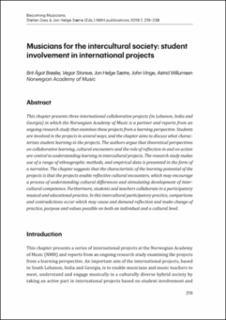Musicians for the intercultural society: student involvement in international projects
Chapter, Peer reviewed
Permanent lenke
https://hdl.handle.net/11250/2827025Utgivelsesdato
2019Metadata
Vis full innførselSamlinger
- Artikler og bokkapitler [390]
Originalversjon
I: Becoming musicians. Student involvement and teacher collaboration in higher music education, s. 219-238Sammendrag
Abstract -
This chapter presents three international collaborative projects (in Lebanon, India and Georgia) in which the Norwegian Academy of Music is a partner and reports from an ongoing research study that examines these projects from a learning perspective. Students are involved in the projects in several ways, and the chapter aims to discuss what characterises student learning in the projects. The authors argue that theoretical perspectives on collaborative learning, cultural encounters and the role of reflection in and on action are central to understanding learning in intercultural projects. The research study makes use of a range of ethnographic methods, and empirical data is presented in the form of a narrative. The chapter suggests that the characteristic of the learning potential of the projects is that the projects enable reflective cultural encounters, which may encourage a process of understanding cultural differences and stimulating development of intercultural competence. Furthermore, students and teachers collaborate in a participatory musical and educational practice. In this intercultural participatory practice, comparisons and contradictions occur which may cause and demand reflection and make change of practice, purpose and values possible on both an individual and a cultural level.
Beskrivelse
Paper from the conference "Becoming Musicians. Student involvement and teacher collaboration in higher music education" - Oslo, October 2018.
